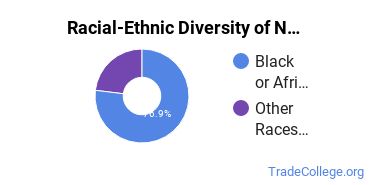Find Trade Colleges
No Grease Barber School Trade Programs
Located in Charlotte, North Carolina, No Grease Barber School is a private for-profit institution. The surrounding area of the school is a good match for students who enjoy city life.
Featured schools near , edit
Where Is No Grease Barber School?

Contact details for No Grease Barber School are given below.
| Contact Details | |
|---|---|
| Address: | 3731 N Sharon Amity Rd, Charlotte, NC 28205 |
| Phone: | 980-819-9481 |
| Website: | www.nogreasebarberschool.com |
Can I Afford No Grease Barber School?
Student Loan Debt
While almost two-thirds of students nationwide take out loans to pay for college, the percentage may be quite different for the school you plan on attending. At No Grease Barber School, approximately 100% of students took out student loans averaging $5,339 a year. That adds up to $21,356 over four years for those students.
No Grease Barber School Undergraduate Student Diversity
Racial-Ethnic Diversity
The racial-ethnic breakdown of No Grease Barber School students is as follows.

| Race/Ethnicity | Number of Grads |
|---|---|
| Asian | 0 |
| Black or African American | 11 |
| Hispanic or Latino | 0 |
| White | 0 |
| International Students | 0 |
| Other Races/Ethnicities | 0 |
No Grease Barber School Trade School Concentrations
The table below shows the number of awards for each concentration.
| Major | Undergraduate Certificate | TOTAL |
|---|---|---|
| Barbering/Barber | 5 | 5 |
| TOTAL | 5 | 5 |
References
*The racial-ethnic minorities count is calculated by taking the total number of students and subtracting white students, international students, and students whose race/ethnicity was unknown. This number is then divided by the total number of students at the school to obtain the racial-ethnic minorities percentage.
More about our data sources and methodologies.
